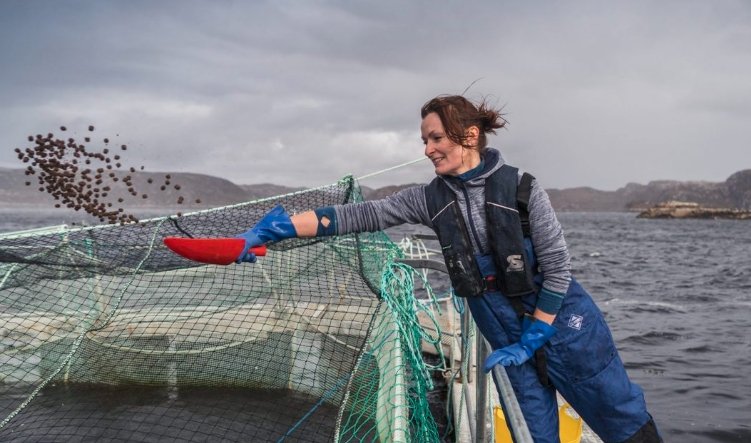Scotland’s salmon farming sector just scored a big win for sustainability, with global agribusiness giant Cargill securing certification for its aquafeed plants under the tough new ASC Feed Standard. It’s a move that could ripple across the seafood supply chain.
The certification means that all of Cargill’s EWOS-branded feed operations for salmonids — including those in Scotland — now meet the stringent benchmarks set by the Aquaculture Stewardship Council. It’s not just about fish anymore. It’s about traceability, ethics, and the climate footprint of everything that goes into that feed bag.
A First for Scotland, a Signal to the Industry
This isn’t a small badge. The ASC Feed Standard is widely viewed as one of the most comprehensive sustainability benchmarks in global aquaculture.
For Scotland — a major player in the global salmon market — the move marks a significant shift. Until recently, few feed producers were willing or able to meet the rigorous documentation and ethical sourcing demands of the ASC.
“This certification is a big deal,” said a senior consultant in marine sustainability who advises UK regulators. “It puts pressure on the rest of the supply chain to clean up.”
The certified Scottish sites are part of Cargill’s global EWOS portfolio, which supplies feed for farmed salmon in multiple markets. By achieving compliance, Cargill is telling retailers and consumers: our feed is clean, audited, and accountable.
Just one sentence: That’s a major flex in a world of growing eco-scrutiny.

What the ASC Feed Standard Actually Requires
So, what does it take to get that green stamp from the ASC? Quite a bit, actually.
The Feed Standard launched in 2021 after years of industry consultation. It’s not just a checklist — it’s a minefield of social, environmental, and corporate requirements.
At its core, the standard looks at three things:
-
Raw material sourcing: Ingredients must come from responsible sources, including fisheries and soy farms
-
Traceability: Feed producers must prove where every input comes from
-
Corporate responsibility: Companies must meet benchmarks on worker safety, community engagement, and emissions
And it’s audited independently. No self-policing here.
For Cargill, which sources thousands of tonnes of ingredients from all over the world, that means tighter controls from fishing vessel to feed sack.
One-liner alert: It’s the difference between “sustainable” as a slogan and sustainable as a certified supply chain reality.
Scotland’s Salmon Sector Faces Pressure to Prove It’s Clean
The Scottish salmon industry is big — and controversial. Worth around £1 billion annually, it’s one of the UK’s most valuable food exports. But it’s also under fire for its environmental impacts, including sea lice outbreaks, escapes, and marine pollution.
Feed has often been the elephant in the room. It’s the single biggest contributor to salmon farming’s carbon footprint.
A 2022 report from Feedback Global, a food and climate NGO, found that over 90% of salmon feed ingredients were either imported or linked to deforestation or overfishing. That’s not great PR when you’re trying to sell premium fish to eco-conscious consumers.
So for feed producers like Cargill to voluntarily certify their plants? It’s a reputational shift — and possibly a defensive one.
“This is about future-proofing the business,” said an executive at a major UK supermarket chain. “Retailers want ASC logos on everything, including feed. That’s where the market’s headed.”
Global Context: More Than Just a Scottish Story
Cargill’s move in Scotland isn’t isolated. The company also confirmed that its Chilean and Norwegian operations are now certified under the same ASC Feed Standard.
That means all its salmonid feed — regardless of geography — now passes the same ethical bar. It creates consistency across supply chains and reassures global buyers.
Here’s how it looks across Cargill’s operations:
| Region | Feed Brand | Certified Plants | Primary Market |
|---|---|---|---|
| Scotland | EWOS | All major sites | UK, EU |
| Norway | EWOS | Multiple sites | EU, Global Export |
| Chile | EWOS | Fully certified | Latin America, Asia |
As one analyst put it, “This is how you bake in credibility — not one market at a time, but across the board.”
What’s Next? Fish Farmers, Retailers, and Governments Take Note
With Cargill setting the bar, attention will now turn to two groups: salmon farmers and regulators.
If farmers want ASC certification for their salmon, they’ll eventually need certified feed — full stop. Many are already asking for it.
Meanwhile, government regulators in Scotland and the EU have been pushing for tighter sustainability disclosure rules across food supply chains. Moves like this help companies stay ahead of red tape.
A few things to watch going forward:
-
Retailers may start demanding ASC feed compliance from all suppliers
-
Smaller feed companies could struggle to keep up with auditing costs
-
Governments may consider making standards like ASC mandatory in public procurement
“This is how the dominoes start falling,” said a seafood policy researcher in Edinburgh. “Once one major player flips the switch, the rest follow — or get left behind.”
One-sentence gut check: There’s no going back to unlabeled feed bags and hand-wavey sustainability claims.


















